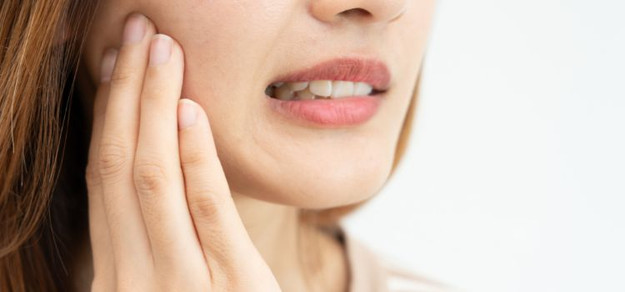How To Heal Cheek Bite
10th Oct 2025

Biting the inside of your cheek hurts and can be hard to ignore. It might happen while eating, talking, or even during sleep. Once it’s sore, it’s easy to bite the same spot again.
The good news is most cheek bites heal on their own. In this guide, we’ll show you how to heal a cheek bite fast and how to stop it from happening again.
How to Heal a Cheek Bite at Home

You can treat most cheek bites at home by following these simple steps:
Rinse with saltwater
Mix half a teaspoon of salt in a glass of warm water. Gently rinse your mouth to clean the area and reduce swelling. Do this 2–3 times a day.
Use ice to reduce pain
Apply a cold compress to your cheek or suck on ice chips. This helps with swelling and numbs the pain.
Apply aloe vera or honey
Dab a small amount of aloe vera gel or honey on the sore. Both help soothe and speed up healing.
Try a numbing gel
Use an over-the-counter oral gel to ease pain and protect the sore while it heals.
Avoid irritating foods
Stay away from spicy, hot, crunchy, or acidic foods. These can make the sore worse. Eat soft, cool foods until it feels better.
Note: Most cheek bites heal in a few days, but caring for it properly helps avoid infection and speeds up recovery.
Understanding Cheek Biting
Cheek biting, medically known as morsicatio buccarum, refers to the habitual or accidental biting of the inner cheek lining.
In a 2013 study, 750 out of every one million individuals with females affected more compared to males.
A 2019 study involving 5,935 pregnant individuals found that about 1 in 10 experienced Cheek biting aka morsicatio buccarum.
A 2013 review suggested that children might bite their cheeks as a way to get attention from others.
This condition can manifest in various ways:
- Accidental Biting: Often occurs during eating or speaking, especially if one is distracted or has misaligned teeth.
- Habitual Biting: Some individuals develop a habit of chewing on their cheeks, which can be linked to stress, anxiety, or concentration.
- Anatomical Factors: Irregularities in tooth alignment, sharp tooth edges, or ill-fitting dental appliances can increase the likelihood of cheek biting.
Did you know: Cheek biting is considered a type of body-focused repetitive behavior (BFRB) in the DSM-5, the diagnostic guide published by the American Psychiatric Association.
Related Articles:
Potential Consequences of Cheek Biting
Persistent cheek biting can lead to:
Tissue Damage: Repeated trauma can cause the inner cheek lining to become thickened, scarred, or develop white patches.
Ulceration: Continuous irritation may result in painful sores or ulcers.
Infection Risk: Open wounds in the mouth are susceptible to bacterial infections, leading to further complications.
What Causes Cheek Biting?

Cheek biting can happen for different reasons. Some are accidental, while others are ongoing habits or dental issues.
Eating or Talking Too Fast
Quick movements while chewing or speaking can cause you to bite your cheek by mistake.
Misaligned Teeth or Dental Work
Sharp, uneven, or misaligned teeth make it easier to bite the inside of your cheek — especially in the same spot.
Stress or Anxiety
Many people bite their cheeks without realizing it, especially when feeling stressed, nervous, or focused.
Teeth Grinding or Clenching (Bruxism)
Grinding your teeth in your sleep can push your cheek between your teeth, leading to accidental biting.
Tight or Crowded Teeth
If there’s not enough space inside your mouth, your cheeks are more likely to get in the way while you chew.
Note: Knowing the cause can help you choose the right solution, like changing habits, visiting your dentist, or using a night guard at night.

- Most Popular
- Hard Outside, Soft Inside
- 2MM Thick
- Moderate / Heavy

- Most Durable
- Hard Materials
- 1.5MM Thick
- Heavy / Severe

- For Day Time Use
- Thin, Barely Visible
- 1MM Thick
- Light / Moderate

- For Clenching
- Flexible & Soft
- 1.5MM Thick
- Light / Moderate
Common Symptoms of a Cheek Bite
After biting your cheek, you might feel a sharp pain or sting. The area can swell or form a small bump. It may look red or turn into a white sore. If the bite is deep, it might bleed. Sometimes, you keep biting the same spot again, which makes it harder to heal.
If it doesn’t get better, it could get infected. Signs of infection include pus, more pain, or a bad taste in your mouth.
Note: Most cheek bites heal on their own, but taking care of them helps them heal faster and prevents problems.
When to See a Doctor or Dentist
Most cheek bites heal on their own in a few days. But if the sore doesn’t get better after a week, or if it gets worse, it’s a good idea to see a doctor or dentist. Watch out for signs of infection like swelling, pus, or a bad smell.
If the pain keeps getting worse, or if you keep biting the same spot again and again, it may be caused by teeth grinding or a bite issue.
Tip: A dentist can check your teeth and may suggest a custom-fit night guard to protect your cheeks while you sleep.
Related Articles:
- Night Guard Online vs Dentist
- Guide to Choosing the Right Night Guard
- Wearing a Night Guard: Pros and Cons
How to Prevent Future Cheek Bites
After your cheek heals, it’s important to stop it from happening again.
Eat slowly and chew carefully to avoid biting your cheek by accident. Try to manage stress, especially if you bite your cheek when you’re nervous or focused. If you grind your teeth at night, you might be biting your cheek in your sleep. Wearing a night guard can help protect your mouth while you sleep.
Note: If you keep biting the same spot, it’s a good idea to see a dentist. They can check if your teeth are causing the problem and suggest the right solution.
FAQs About Cheek Biting
1. How long does a cheek bite take to heal?
Most cheek bites heal within 3 to 7 days if you keep the area clean and avoid irritating foods.
2. Can a cheek bite get infected?
Yes, if the sore isn’t cared for properly. Signs of infection include swelling, pus, and a bad taste in your mouth.
3. Why do I keep biting the same spot?
You may be biting that area again before it fully heals. It can also be caused by misaligned teeth or grinding your teeth at night.
4. Does a night guard help with cheek biting?
Yes. A night guard creates a barrier between your teeth and cheeks, helping to stop nighttime cheek biting.
5. Can stress cause cheek biting?
Yes. Some people bite their cheeks when they’re nervous, focused, or under stress without even realizing it.
Conclusion
Cheek bites can be painful, but they usually heal on their own. Rinsing with saltwater, using ice, and avoiding hard or spicy foods can help them heal faster.
If you keep biting your cheek, it might be due to stress, teeth grinding, or a bite problem. A custom night guard can help protect your cheek while you sleep.
If the bite doesn’t heal or keeps coming back, it’s best to see a dentist. With the right care, you can stop the pain and prevent it from happening again.
References:
- Sears, V. H. (1960). Cheek biting. Journal of the American Dental Association, 60(4), 479–481. https://doi.org/10.1016/S0002-8177(60)04006-3
- Kumar, S., & Bagewadi, A.** (2013). Habitual biting of oral mucosa: A conservative treatment approach. Contemporary Clinical Dentistry, 4(3), 386–388. https://doi.org/10.4103/0976-237X.118390
- Moritz, S., Müller, K., & Schmotz, S. (2020). Escaping the mouth-trap: Recovery from long-term pathological lip/cheek biting (morsicatio buccarum, cavitadaxia) using decoupling. Journal of Obsessive-Compulsive and Related Disorders, 25, 100530. https://doi.org/10.1016/j.jocrd.2020.100530
- McKinney, R., Olmo, H., & McGovern, B. (2024, January 11). Benign chronic white lesions of the oral mucosa. In StatPearls. StatPearls Publishing. https://www.ncbi.nlm.nih.gov/books/NBK570596/
- Bhatia, S. K., Goyal, A., & Kapur, A. (2013). Habitual biting of oral mucosa: A conservative treatment approach. Contemporary Clinical Dentistry, 4(3), 386–389. https://doi.org/10.4103/0976-237X.118357
- Bett, J. V. S., Batistella, E. Â., Melo, G., Munhoz, E. A., Silva, C. A. B., Guerra, E. N. da S., Porporatti, A. L., & De Luca Canto, G. (2019). Prevalence of oral mucosal disorders during pregnancy: A systematic review and meta-analysis. Journal of Oral Pathology & Medicine, 48(4), 270–277. https://doi.org/10.1111/jop.12831

- Most Popular
- Hard Outside, Soft Inside
- 2MM Thick
- Moderate / Heavy

- Most Durable
- Hard Materials
- 1.5MM Thick
- Heavy / Severe

- For Day Time Use
- Thin, Barely Visible
- 1MM Thick
- Light / Moderate

- For Clenching
- Flexible & Soft
- 1.5MM Thick
- Light / Moderate
